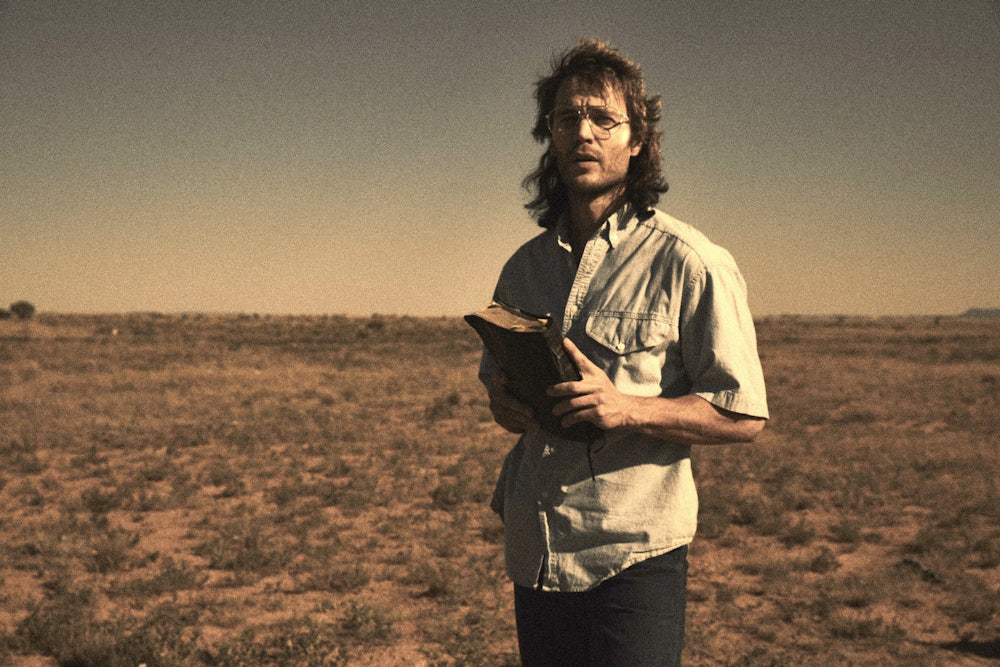The chief negotiator of the FBI is teaching a class. Behind him, a big board reads BAD THINGS HAPPEN. The year is 1993 and the board is correct, for the negotiator, whose name is Gary Noesner, is shortly to arrive in Waco, Texas.
This is Paramount’s new dramatization of the Waco standoff, which led to the deaths of 79 members of the Branch Davidian sect after a botched raid by the Bureau of Alcohol, Tobacco, Firearms, and Explosives morphed into a siege by the FBI. Disagreements between the FBI’s negotiating team and blunt-force advocates led to disorganization and indecision, and after 51 days, the FBI launched a tear gas attack. Mount Carmel burned to the ground, all while the cameras rolled. Two years later to the day, Timothy McVeigh bombed a federal building in Oklahoma City, citing Waco as evidence of a bully government whose nose needed bloodying.
The miniseries certainly corrects a number of misconceptions about the siege that were spread by an embarrassed law enforcement after it all went wrong. Maybe the Branch Davidians didn’t shoot first during the initial ATF raid, and maybe they weren’t deranged cultists at all. But the first four episodes of the six-episode show are so strongly tilted towards the perspective of sect leader David Koresh and his followers that it feels like an exculpation.
The bias is partly explained by the fact that the series is based on books written by a surviving Branch Davidian named David Thibodeau (titled A Place Called Waco) and the FBI negotiator Noesner (Stalling For Time: My Life As An FBI Hostage Negotiator). But why make a TV show like this now? Maybe Paramount is simply looking to right a historical wrong with an entertaining show. Or maybe the anti-government far right is no longer a fringe group, but a market that the networks are starting to target.
In the first episode, we are introduced to Koresh—played by Taylor Kitsch of Friday Night Lights fame—as a reasonable man. In a flash-forward scene, his home is on fire. He goes out with his hands up, and yells, “Please, stop! There are women and children in here!” There’s a gunshot, and the screen goes dark.
The show then brings some context into the story of Waco by starting, instead, with Ruby Ridge, a 1992 siege on a white supremacist stronghold in remote Idaho that also led to multiple deaths. The ATF was humiliated by the episode and sought to burnish its image, the show makes out, by focusing on the Branch Davidians. Law enforcement is portrayed on the show as totally incompetent—except for Noesner, author of one of the source books, who is wise. The Branch Davidians, including David Koresh, come off as essentially good-hearted and stupid—except David Thibodeau, author of the other source book, who is of normal intelligence.
That those two characters are the best realized of the show betrays something about its bias. So much is not known, or is only known from the testimony of Thibodeau. Can the show say with certainly what really went on in the bedroom between Koresh and his wives? It can’t—the drama is speculative.
Taylor Kitsch is funny and likeable as Koresh. Andrea Riseborough (most recently seen in Black Mirror’s “Crocodile”) plays one of the women he took as a “wife,” though she had joined the sect already married to another member. John Leguizamo plays a hapless undercover agent. Rory Culkin takes on the role of Thibodeau, the surviving cult member. Noesner is done by Michael Shannon, a great piece of casting: His grave face works as a kind of anchor weighing down the frantic action inside Mount Carmel.
The show makes much of the conflict between Noesner and the FBI cohort that wants to crush the sect with military might. Noesner gets a lot of good lines about hearing people out, even when they seem nuts. “There’s a paradox to power,” he says, walking down an FBI corridor. “The more force you bring to a situation, the more likely you are to meet resistance.” Later on, when the situation is already becoming intractable, a less enlightened FBI agent responds, “Show of force helps bring people to the negotiating table.”
Apart from the conflict between the negotiators and the show-of-forcers, the chief conflict in Waco is between reasonable Americans who just happen to live a strange way, and a government that won’t leave them alone. No serious mention is made of the Branch Davidians’ controversial beliefs. The sect had played host to antics like resurrection contests, in which a candidate for leader dug up a corpse, and they believed Armageddon was imminent. Even a fake wedding, designed to conceal the fact that Koresh had fathered a child with an underage girl, is portrayed with whimsical charm. The girl smiles sweetly as Koresh plays the wedding march on an electric guitar like Slash in the “November Rain” video. The intimate humanization of Koresh and his followers comes across as a pure defense, a vindication of the rights of fringe groups to exist with huge stockpiles of guns without attracting the eye of law enforcement.
The people who will enjoy this show the most are those who, like Koresh and the Ruby Ridge white supremacists, believe that the government has no place in the lives of everyday Americans. Fanatics of “gun rights” will like it, too. The gun nuts and the white supremacists are more “normal” than they’ve ever been, so if there were ever a moment to make money off the extreme right, it’s now. But if you don’t care for guns and you don’t think that religious leaders should collect underage “wives” with impunity, then Waco will make for difficult watching.
